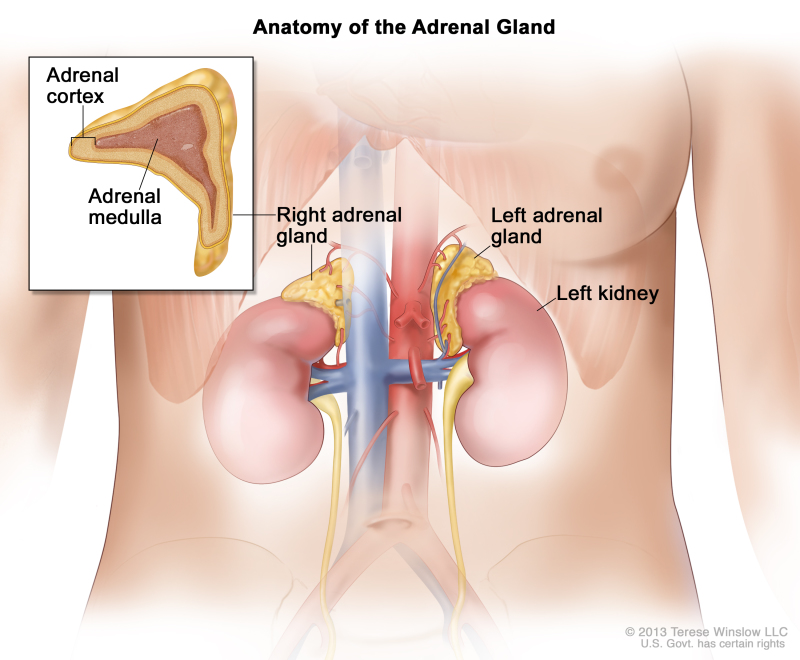
Stress: How to Overcome Adrenal Fatigue
- Posted by admin
- On July 19, 2018
- 0 Comments
By Dr. David Brown
In this day and age when life moves in what feels like hyperspeed, it is near impossible not to be negatively affected by stress on a regular basis. Stress comes in many forms and to a certain point is a normal, even healthy, part of life. But it is no surprise that too much stress can have damaging effects on the body.
The Adrenal System
The adrenal glands are the organs that sit on top of each kidney whose primary function is to manage stress within the body. They are made up of an outer portion called the adrenal cortex and an inner portion called the adrenal medulla.

Created for the National Cancer Institute, http://www.cancer.gov
The adrenal cortex produces and releases important hormones such as glucocorticoids, like cortisol, and mineralocorticoids, like aldosterone. These hormones help regulate blood sugar, balance minerals, and decrease inflammation within the body. The adrenal cortex also plays a role in the reproductive system by producing the sex corticoids, testosterone and estrogen.
The inner portion, the adrenal medulla, secretes the hormones epinephrine and norepinephrine. These two hormones work together to combat stress by mobilizing sugar from storage within the body and controlling the autonomic nervous system. Epinephrine, or more commonly referred to as adrenaline, is responsible for the “fight or flight” response.
Adrenal Stress Disorder
When the adrenal system is faced with an overwhelming amount of stress and is incapable of keeping up with the demands placed upon it, a condition called Adrenal Stress Disorder (ASD) can result. Someone who is dealing with ASD may experience a variety of symptoms including but not limited to fatigue, dizziness, joint pain, allergies, digestive disturbances, asthma, palpitations, back pain, headaches, impotence, colitis, chest pains, moodiness, mental anxiety, nervousness, mental sluggishness, and shakiness. Because these symptoms vary so greatly, many doctors fail to recognize ASD as the underlying problem.
Adrenal stress disorder is caused by three factors: increased stress/demand, nutritional deficiencies/poor diet, and structural dysfunction. There are three stages of ASD that are collectively called general adaptation syndrome (GAS). The first stage is the alarm stage where adrenal function is triggered in response to a particular stressor. The second stage is the resistance stage where the stress is prolonged and the adrenal glands grow in size to keep up with the increased demands. The third and final stage is the exhaustion stage where the adrenals eventually become depleted.
Often times ASD goes undiagnosed because even though the adrenal system is not functioning optimally and symptoms are present, a disease process is not yet occuring that is detectable through labs. If this condition persists long enough, however, adrenal failure can eventually occur and result in a disease called Addison’s disease. At that point, hormone medication is usually required to preserve life.
Natural ways to deal with stress
There are many natural ways to deal with stress and prevent or reverse adrenal stress disorder.
Remove the stressors
The most obvious way to reduce stress is to remove yourself from stressors. Many times we burden ourselves by overcommitting and overextending. This all too often results in unnecessary stress. So examine your life and let go of those stressors that are within your control. Of course this isn’t feasible for all stressors, for instance, if it’s your job or a family issue that is the main culprit. But taking regular breaks, like yearly vacations, monthly personal days, and daily quiet times, is of great benefit to the adrenal system.
Eat clean
Our body requires certain nutrients in order to carry out all physiological processes. Unfortunately the typical western diet often fails to meet these requirements. Eating high quality protein from grass-fed meat, wild-caught fish, and pasture raised poultry, complex carbohydrates from organic vegetables and fruits, and healthy fats like flax oil and avocado (while also avoiding processed food) will provide the nutrients essential for optimal adrenal function.
Avoid stimulants
Caffeine, cigarettes, alcohol, starch, and sugar all stimulate the adrenal system. When the adrenals are constantly overstimulated as common with today’s high-sugar, high-caffeine diet, it is impossible to maintain adequate levels of important hormones and neurotransmitters. Avoiding these substances will allow the body time to reverse this stimulant dependency and rebuild the adrenal system so that it can function optimally.
Get adequate sleep
Normal sleep patterns are crucial to adrenal function. The adrenal system must rest in order to rebuild. Staying up late and getting up early interferes with normal hormone production and secretion putting extra stress on the adrenals. Going to bed before 10:30 pm and getting 8 hours of sleep per night is ideal for most adults.
Exercise
While exercise can be beneficial for the adrenal system, it is important not to overdo it. Exercise is a physical stressor that can tax the adrenals even more especially if they are already fatigued. On the other hand, when done safely and correctly, it can help reduce stress by releasing endorphins and improving attitude and overall health. Twenty minutes of aerobic activity consistent with your current fitness level 3-5 times a week is ideal. As adrenal health is restored, exercise intensity can be increased.
Chiropractic Care and Applied Kiniesiology
It’s no surprise that stress can result in misalignment of the musculoskeletal system. Chiropractic adjustments work wonders when it comes to relieving stress. Finding a practitioner that uses AK is even better, as the treatment plan is then individualized for the specific need of the patient.
If you or a loved one believe you are suffering from adrenal fatigue, try some of these tips and call the office today to make an appointment!

David Brown, DC, DIBAK


